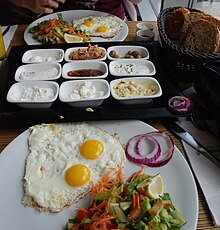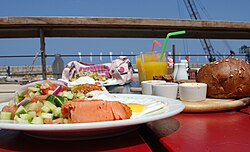
An Israeli breakfast is a style of breakfast that originated on Israeli collective farms called kibbutzim, and is now served at most hotels in Israel and many restaurants.[1] It is usually served buffet style, and consists of fruits, vegetables, salads, breads, pastries, dairy foods, eggs and fish. Meat is never included.
History
[edit]During the early days of the state of Israel, residents of a kibbutz ate their meals in a communal dining hall.[2] It was common for the residents to eat a light snack early in the morning, and then work in the fields for several hours. Then they returned to the dining hall for a hearty mid morning buffet meal, similar to a brunch.[2] By the 1950s, Israeli hotels were promoting the "Israeli breakfast" in a style similar to the kibbutz meals.[3] In 1979, members of the Jerusalem Hotel Association and the Israeli Hotel Owners Association decided to phase out the full Israeli breakfast as a part of their basic hotel room rate, substituting it with a more modest Continental breakfast instead, in order to reduce costs.[4] The effort was not successful, and the tradition of a hearty breakfast buffet continued.
Characteristics and typical dishes
[edit]At hotels in Israel, the Israeli breakfast is commonly presented as a self-service buffet.[4][5] In smaller restaurants, a more streamlined menu may be presented through sit down table service.[6]
The Israeli breakfast never includes meats such as ham and bacon, which are common on breakfast menus in many other countries. In accordance with the Jewish laws of Kashrut, meat and dairy ingredients are never served together in a meal and pork products are forbidden. The Israeli breakfast is a dairy meal, and a variety of cheeses are offered. Fish is pareve and so is permitted with a dairy meal, and herring is frequently served.[1][4] Other smoked or pickled fish dishes are also common,[5] including sprats, sardines[6][7] and salmon.[6]
Egg dishes are almost universal,[1][2][4][5][7] which may be pre-cooked or cooked to order. The Maghrebi egg dish shakshouka (shakshuka), brought to Israel by Tunisian Jews,[8] is a common choice, comprising eggs poached in tomato sauce.[1][6][9]
Other Middle Eastern dishes may include Israeli salad, hummus, tehina, halloumi, ful medames, baba ghanoush and the strained yogurt known as labaneh.[9] Fresh vegetables such as tomatoes, cucumbers, green peppers, radishes, onions and shredded carrots are common, as are olives.[1][2][3][4][7][9] A variety of salads are available.[5] Coffee, tea, juices, fresh fruits, bread and pastries complete the menu.
Gallery
[edit]-
A breakfast buffet at a hotel in Haifa, Israel
-
An Israeli breakfast
-
An Israeli breakfast with eggs, Israeli salad, bread and various accompaniments
See also
[edit]References
[edit]- ^ a b c d e Dubois, Jill; Rosh, Mair (2004). Cultures of the World: Israel. Singapore: Marshall Cavendish. p. 122. ISBN 9780761416692.
- ^ a b c d Marks, Gil (2010). Encyclopedia of Jewish Food. Boston: Houghton Mifflin Harcourt. ISBN 9780544186316.
- ^ a b Sutton, Horace (April 10, 1955). "Big Breakfasts For Bible Land: Land of milk and honey also serves herring, carrots, olives in the a.m." St. Petersburg Times. St. Petersburg, Florida. Retrieved April 7, 2013.
- ^ a b c d e Torgerson, Dial (September 6, 1979). "Israeli Breakfast ... is being replaced by the continental breakfast: coffee and a roll". Sarasota Herald-Tribune. Sarasota. pp. 8–CF. Retrieved April 7, 2013.
- ^ a b c d Stern, Bonnie (October 1, 2005). "48 hours in Jerusalem". Nanaimo Daily News. Nanaimo. Archived from the original on December 31, 2013. Retrieved April 7, 2013.
- ^ a b c d Deane, Daniela (August 10, 2012). "Smart Mouth: The delectable nature of Israeli breakfast". Washington Post. Washington, DC. Archived from the original on July 28, 2013. Retrieved April 7, 2013.
- ^ a b c Armstrong, Alicia (May 25, 1973). "Israeli Breakfast: Lox, Stock and Barrel". Milwaukee Journal. Milwaukee. p. 9. Retrieved April 7, 2012.[permanent dead link]
- ^ Marks, Gil (2010). The Encyclopedia of Jewish Food: "Shakshuka". New York, New York: Houghton Mifflin Harcourt. pp. 547–548. ISBN 978-0-470-39130-3.
- ^ a b c "Typical Israeli Breakfast: Bountiful". CBSNews.com. New York City. November 6, 2009.
External links
[edit] Media related to Breakfast in Israel at Wikimedia Commons
Media related to Breakfast in Israel at Wikimedia Commons- The Israel Breakfast- Best in the World


